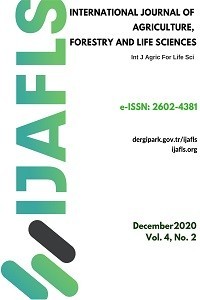POLYGENIC RESISTANCE OF IMPROVED RED PEPPER LINES TO PHYTOPHTHORA CAPSICI
POLYGENIC RESISTANCE OF IMPROVED RED PEPPER LINES TO PHYTOPHTHORA CAPSICI
___
- Abak, K. 1982. Biberlerde Kökboğazı Yanıklığına dayanıklılığın kalıtımı üzerinde araştırmalar. A.Ü.Ziraat Fakültesi, Bakçe Bitkileri Bölümü, Doçentlik Tezi, Ankara.
- Choi, K. S., Young, H. O., Cang, H. L. and Jae, W. L. 1985. Studies On Varietal Differences and Inheritance of Resistance to Phytophtora capsici In Red Peppers Of Korea. Capsicum and Eggplant Newsletter, 5:39-40 p.
- Galmarini, C. R. 1997. Pepper Breeding in Argentina. Capsicum and Eggplant Newsletter. 16: 28-34.
- Guerrero-Moreno, A. and Laborde, J.A. 1980. Current Status of Pepper Breeding for Resistance to Phytophthora capsici in Mexico. IV. Meeting Eucarpian Capsicum Working Group. Wageningen: 52-56.
- İren, S., Maden, S., Patlıcangil, B., & Etmeni, K. T. B. Y. H. Phytopthora capsici Leon Enfeksiyonlarına Karşı Serada Reaksiyonlarının Tespiti. Ankara Üniversitesi Ziraat Fakültesi Yıllığı, 26, 323-330.
- Kim, E. S. and Hwang, B. K. 1992. Virulence to Korean pepper cultivars of isolates of Phytophthora capsici from different geographic aeras. Plant Disease 76:486-489.
- Kiran, O. F., & Ertunc, F. 1998. Detection of the Disease of Solanaceous Plants in Van Province. JOURNAL OF TURKISH PHYTOPATHOLOGY, 27, 105-112.
- Lee, B. K., Kim, B. S., Chang, S. W. and Hwang, B. K. 2001. Aggressiveness to pumpkin cultivars of isolates of Phytophthora capsici from pumpkin and pepper. Plant Dis. 85:497-500.
- Lefebvre, V. and Palloix, A. 1996. Both additive and Epistatic Effects of QTLs are Involved in Polygenic Induced Resistance to Diseases: A Case Study, the Interaction Pepper- Phytophthora capsici Leon. Theor. Appl. Genet. 93: 503-511.
- Leonian, LH. 1922. Stem and fruit blight of pepper caused by Phytophthora capsici sp. Nov. Phytopathology 12: 401-408.
- Metsalu, T., & Vilo, J. (2015). ClustVis: a web tool for visualizing clustering of multivariate data using Principal Component Analysis and heatmap. Nucleic acids research, 43(W1), W566-W570.
- Milkova, L., Vitanov, M. and Daskalov, S. 1988. Phytostop – A New Cultivar Resistant To Phytophtora capsici Capsicum and Eggplant Newsletter, 7: 62.
- Pochard E.1964.Piment. Rapport, d’Activite 1964.Stat. d’Amelior.Plantes Maraich. d’Avignon (France):41-46.
- Pochard, E. and Daubèze, A. M. 1982. Comparison of Three Different Sources of Resistance to Phytophthora capsici in Capsicum annuum. Capsicum and Eggplant Newsletter, 1: 59-62.
- Ruffel, S., Gallois, J. L., Moury, B., Robaglia, C., Palloix, A., & Caranta, C. (2006). Simultaneous mutations in translation initiation factors eIF4E and eIF (iso) 4E are required to prevent pepper veinal mottle virus infection of pepper. Journal of General Virology, 87(7), 2089-2098.
- Simon, J.J., Webster, R.K. 1979. Idendification of strains and inheritance of pathogenicity in Phytophthora capsici. Phytopathology, 62:20-26.
- Smith, P. G., Kimble, K. A., Grogan, R. G. and Millett, A. H. 1967. Inheritance of resistance in peppers to Phytophthora root rot . Phytopathology. 57:377-379.
- Sotirova, V. and Daskalov, S. 1983. Use of Induced Mutations In Developing Pepper Forms Resistant to Phytophtora capsici Leonian. Capsicum and Eggplant Newsletter, 2: 48-50
- Soylu, S., & Kurt, Ş. 2001. Occurrence and distribution of fungal diseases on greenhouse grown pepper plants in Hatay Province. In International XIth EUCARPIA Meeting on Genetics and Breeding of Capsicum & Eggplant (pp. 315-319).
- Thabuis, A., Lefebvre, V., Bernard, G., Daubeze, A. M., Phaly, T., Pochard, E., & Palloix, A. 2004. Phenotypic and molecular evaluation of a recurrent selection program for a polygenic resistance to Phytophthora capsici in pepper. Theoretical and Applied Genetics, 109(2), 342-351.
- Thabuis, A., Palloix, A., Pflieger, S., Daubeze, A.M., Caranta, C. and Lefebvre, V. 2003. Comparative mapping of Phytophthora resistance loci in pepper germplasm: evidence for conserved resistance loci across Solanaceae and for a large genetic diversity. Theor. Appl. Genet. 106: 1473-1485.
- Thabuis, A., Palloix, A., Servin, B., Daubeze, A. M., Signoret, P., & Lefebvre, V. 2004 a. Marker-assisted introgression of 4 Phytophthora capsici resistance QTL alleles into a bell pepper line: validation of additive and epistatic effects. Molecular Breeding, 14(1), 9-20.
- Yamakawa K., Mochizuki T., Yasui H. 1979. Screening of Cultivated and Wildpeppers for Phytophthora capsici Resistance and Its Inheritance. Bull. Veg. And Ornam. Crops. Res.Stat. Japan Ser., A. (6): 29-38.
- Yayın Aralığı: Yılda 2 Sayı
- Başlangıç: 2017
- Yayıncı: Volkan OKATAN
DETERMINATION OF SUITABLE AREAS OF APPLE (MALUS DOMESTICA) CULTIVATION WITH AHP AND GIS TECHNIQUES
Namık Kemal SÖNMEZ, Sahriye SÖNMEZ, Mesut ÇOŞLU, Hasan Raşit TÜRKKAN
NATURE CONSERVATION AREAS PROTECTED UNDER VARIOUS STATUES IN THE CITY OF ERZINCAN
Metin DEMIR, Ahmet Mesut CANER
SOME ANIMAL OFFERINGS IN THE HITTITE RELIGIOUS RITUALS
INVESTIGATIONS ON SOME PROPERTIES OF CURRANT AND GOOSEBERRY VARIETIES GROWN IN ORGANIC CONDITION
EFFECTS OF CALCIUM ASCORBATE AND CALCIUM LACTATE ON QUALITY OF FRESH-CUT PINEAPPLE (Ananas comosus)
Roden TROYO, Antonio Jr. ACEDO
Ahmed Kasim DUBE, Burhan OZKAN
DEVELOPMENT IN SOYBEAN PRODUCTION AND FOREIGN TRADE IN TURKEY
Hilal YILMAZ, Pınar ÇUBUKÇU, Mevlüt GÜL, Ahmet Korhan ŞAHAR, Metin Göksel AKPINAR
Catherine ARRADAZA, Ma. Lourdes O. CEDO, Rocelie R. ZARA, Rachel Ann GONZAGA
EFFECT OF SEAWEED EXTRACT (SE) ON SEED GERMINATION CHARACTERISTICS OF WHEAT IN SALTY CONDITIONS
